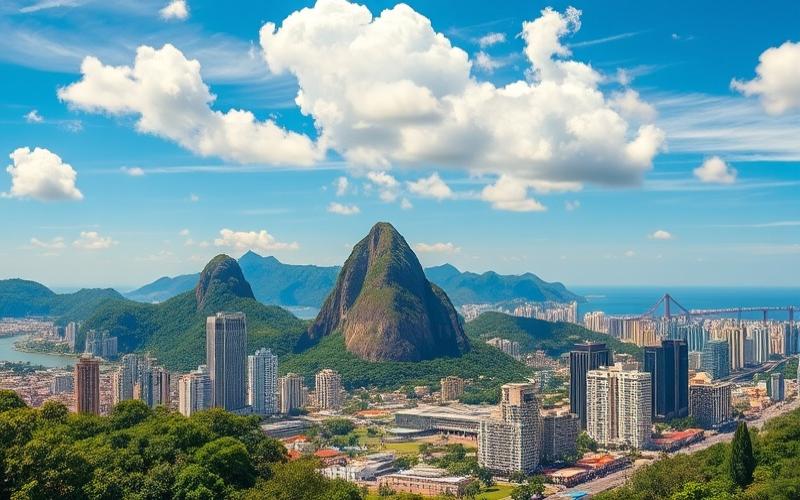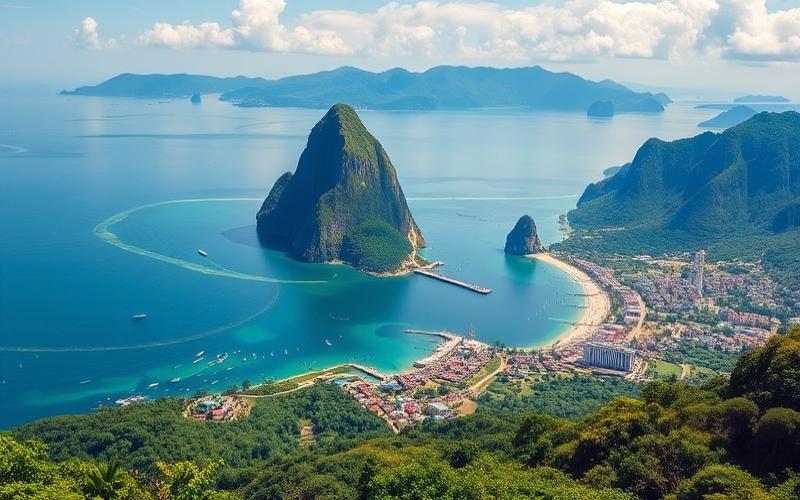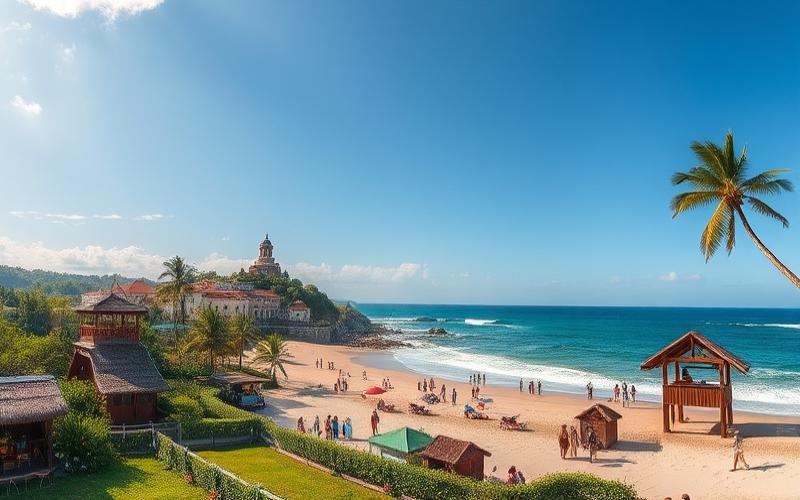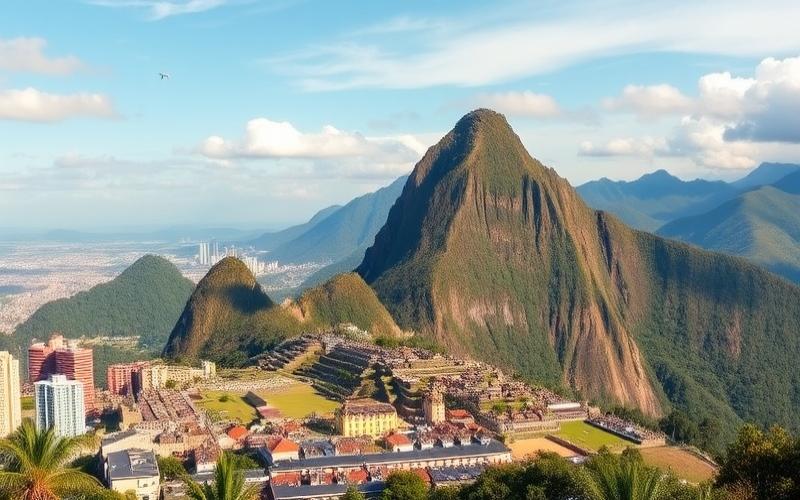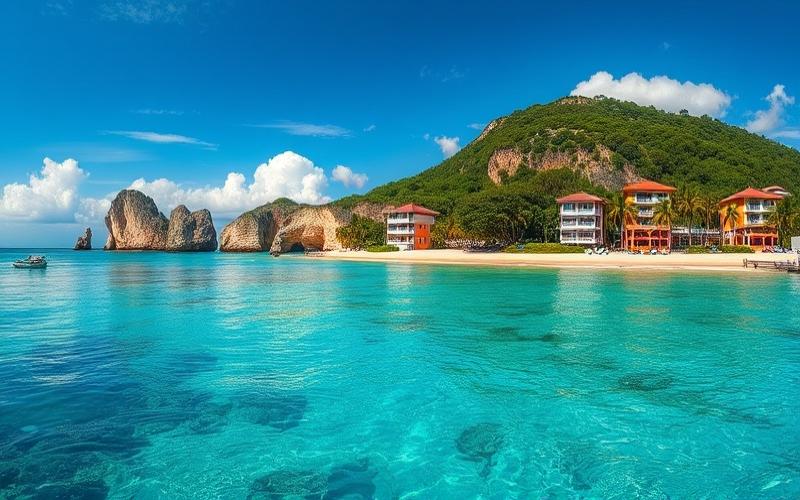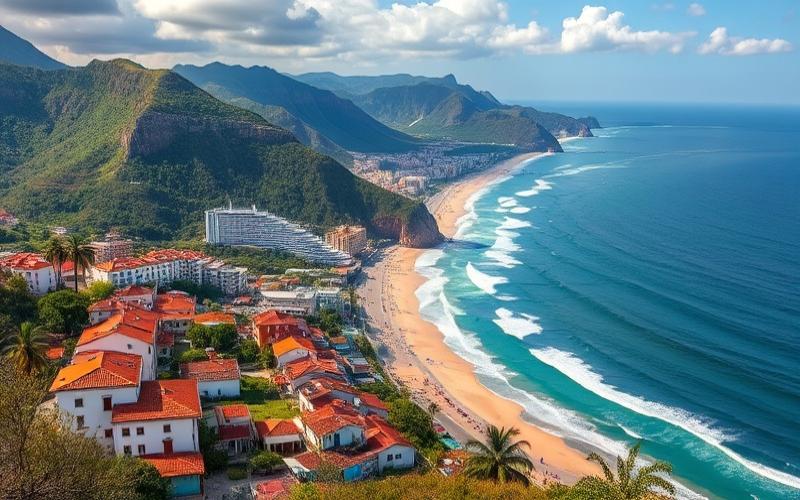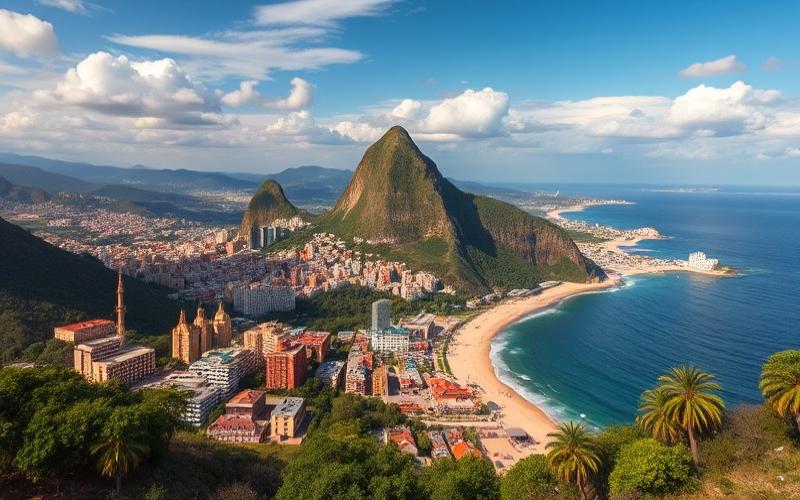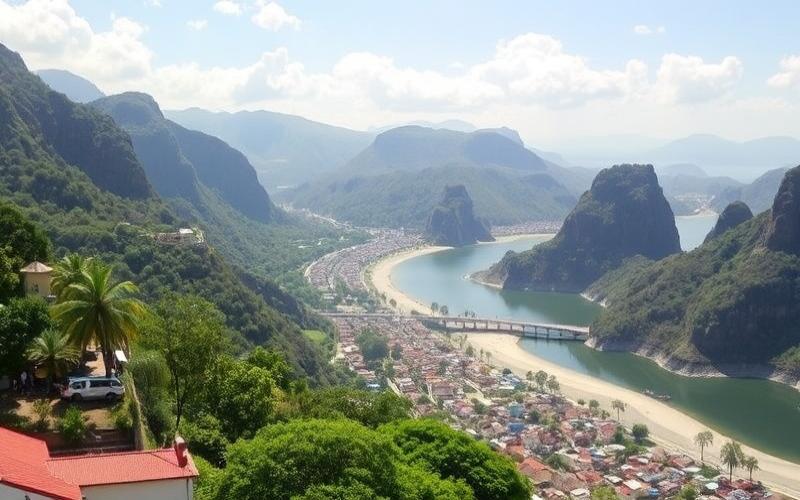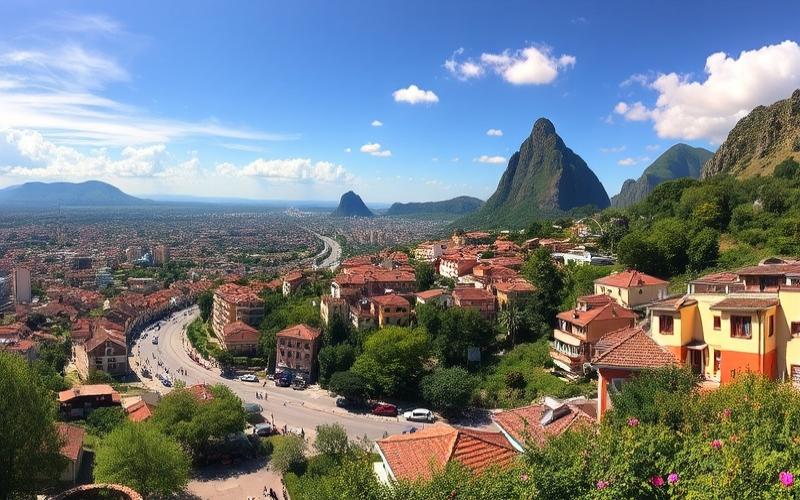
 Published on and written by Cyril Jarnias
Published on and written by Cyril Jarnias
Moving Abroad: The Brazilian Adventure
Moving abroad can be a fascinating adventure and a bold challenge, especially when it comes to a country as vast and culturally diverse as Brazil. More and more French citizens are making this choice, attracted by a different quality of life, tropical climate, and the country’s cultural richness.
Why Choose Brazil?
This article explores the captivating stories of these expatriates who became property owners in Brazil, revealing the deep motivations that drive them to build their lives under new skies, the opportunities they seize, and the obstacles they overcome daily.
The Daily Life of French Expatriates
Through personal anecdotes and life experiences, we’ll dive into the daily lives of these French residents, offering a unique perspective on the intersection of cultures and how they integrate their French roots into the Brazilian universe.
Good to Know:
Brazil offers interesting real estate opportunities, but it’s essential to research local regulations thoroughly before investing.
Successful Expatriation: Stories of French Expatriates in Brazil
The stories of Marianne (Florianópolis), Karim (São Paulo), and Élodie & Thomas (Olinda) illustrate three successful expatriation journeys, each anchored in home ownership, with real obstacles and concrete benefits.
- Marianne, 34, developer, bought an apartment in Lagoa da Conceição after 11 months of renting. The viewings surprised her with the importance given to condominium amenities (pool, barbecue area, 24-hour concierge) and internal rules posted in the elevator. She learned to negotiate the “condomínio” fees and to consider the “vaga de garagem” (parking space) as a real value criterion. Obtaining her CPF online, then opening an account, were her first administrative victories. Her favorite anecdote: on signing day, the seller brought a guaraná cake and the notary posed for a group photo—a mix of formality and human warmth that made her “fall in love” with the country.
- Karim, 42, engineer, targeted an “apart-hotel” in Vila Mariana to benefit from services (concierge, gym) and rental income when he travels. The negotiation confronted him with terms like escritura, matrícula, IPTU, ITBI, and checking for “ônus” (debts, seizures) on the building registry. He hired a “despachante” to speed up paperwork. What surprised him: the importance of face-to-face interaction; sharing coffee with the building manager unlocked more than emails ever did. Today, he rents a parking space to a neighbor via the condominium’s WhatsApp group, covering part of his condo fees.
- Élodie & Thomas, 51 and 55, restored a colorful house in Olinda’s historic center. They discovered the logic of “geminadas” houses (semi-detached), the importance of “alvarás” for renovations, and local heritage protection. Two months were spent clarifying a discrepancy between the cadastral area and the built reality, then reaching a compromise: regularization after renovations. Their integration took off from one detail: lending their “varanda” (porch) during carnival for a “bloco” music group. “That day, the neighborhood adopted us.”
Main Challenges Overcome
- Bureaucracy and Records: understanding the difference between escritura (deed), matrícula/registro (registry entry), and the need to verify absence of “penhora” (seizure) or “ônus reais” (encumbrances).
- Language and Cultural Nuances: accepting that negotiation happens through relationships, shared coffee, and trust, as much as through documents.
- Financing: high interest rates and local income requirements; trade-offs between Brazilian credit, cash down payment, or partial refinancing in Europe.
- Legal Security: ensuring the legality of annexes, mezzanines, dependencies; avoiding properties with unregulated extensions.
- Taxation and Fees: anticipating IPTU, condomínio, and notary fees; understanding the impact of location on these costs.
- Time: accepting that “pra já” can mean “soon” and that deadlines extend without active follow-up.
What Surprised Them About the Process
- The social importance of condominiums: meetings (assembleia), highly present building managers, hyperactive WhatsApp groups.
- “Living” viewings: sellers present, neighbors providing information, the guard’s dog sometimes serving as welcome.
- The role of cash and proof of funds in negotiation, with a preference for quick closing over maximum price.
- The role of the cartório (notary office): a world of its own, rigorous but accessible, where politeness and patience open doors.
Advantages and Concrete Benefits Since Purchase
- Daily Stabilization: neighborhood anchoring, sense of belonging, local routines (bakery, market, gym).
- Quality of Life: climate, nature (beaches, forests), daily culture (music, parties, conviviality).
- Financial Optimization: living costs outside major cities often lower, possibility of seasonal rental income, asset diversification.
- Social and Professional Network: condominium mutual aid, informal business opportunities (powerful word-of-mouth), accelerated Portuguese learning.
Anecdotes That Speak Volumes
- Marianne negotiated a reduction after offering to keep the built-in furniture: “Less logistics for them, 3% less for me.” The local carpenter then upgraded the doors “por conta da casa” (on the house).
- Karim organized a “churrasco” (barbecue) on the rooftop the day he received the keys. Three neighbors spontaneously introduced him to their accountants, who helped regularize his CPF and IPTU within a week.
- Élodie & Thomas discovered their luthier neighbor had made a “pandeiro” (tambourine) for a famous percussionist. They now host a monthly workshop on their “varanda,” which has become a neighborhood meeting point.
Practical Advice for Future Expat Buyers
Before Making an Offer:
- Obtain a CPF and active tax email.
- Open a local bank account and prepare proof of funds.
- Request a complete file: updated matrícula, negative certificates (seller and property), proof of paid IPTU, condominium fees, ongoing lawsuits.
- Visit at different times; speak with the doorman and building manager.
Legal and Notary Office:
- Check for “ônus” and “penhoras” on the matrícula; request the history of previous owners.
- Ensure all property debts are settled before signing and recorded in the deed.
- Use a lawyer or “despachante” independent of the seller; avoid relying solely on the real estate agent.
Financing:
- Compare: local mortgage vs. down payment + refinancing in Europe vs. negotiated cash payment.
- Anticipate mandatory insurance (MIP/DFI) and the impact of the base rate on monthly payments.
- Keep a reserve of 5–8% for ITBI, notary fees, registration, and miscellaneous expenses.
Taxation and Recurring Costs:
- Budget for annual IPTU, condomínio (variable depending on services), and maintenance.
- Check condominium policy for Airbnb/short-term rentals if considering rental income.
Renovations and Compliance:
- Request plans, verify previous permits, photograph existing conditions before renovations.
- For historic zones, anticipate authorization delays and facade constraints.
Social and Economic Integration:
- Join the neighborhood association, participate in “mutirões” (collective work days) and “assembleias.”
- Learn everyday Portuguese; greeting the doorman by his first name is social gold.
- Buy local (markets, artisans), offer your skills to the neighborhood (classes, workshops).
- Build a network of reliable service providers through recommendations (electrician, plumber, accountant).
Negotiation:
- Prefer a clear closing schedule over micro-price negotiation.
- Offer to take certain built-in furniture, negotiate based on documented actual repairs.
- Holidays and vacations slow everything down; plan signings outside carnival and year-end periods.
Comparative Table of Experiences and Trade-offs
| Profile | City | Property Type | Key Challenge | Cultural Surprise | Major Benefit | Key Advice |
|---|---|---|---|---|---|---|
| Marianne | Florianópolis | Condominium Apartment | Understanding Condo Fees and Rules | Human Warmth at Notary Office | Stability + Nature | Speak with Building Manager Before Offer |
| Karim | São Paulo | Apart-Hotel | Legal Checks and Financing | Power of Coffee/Relational Negotiation | Rental Yield + Services | Hire Independent Despachante |
| Élodie & Thomas | Olinda | Historic House | Cadastral Regularization and Permits | Festive and Collaborative Neighborhood | Deep Integration | Get Involved in Neighborhood Life |
Quick Pre-Purchase Checklist
- CPF, bank account, proof of funds ready.
- Lawyer or despachante chosen by you.
- Updated matrícula, negative certificates, debt and litigation history.
- Total budget including ITBI, notary fees, condomínio, IPTU, renovation reserve.
- Condominium rules read (rentals, pets, renovations, schedules).
- Meeting with building manager and doorman, discussions with 2–3 neighbors.
- Visits at different times and verification of noise, light, security.
- Planning signings outside holiday periods.
Important Text: Buying in Brazil as an expatriate is possible and enriching. The key is combining document rigor, local network, and respect for relational codes. Property ownership isn’t just an investment: it’s an accelerator of integration and quality of life.
Good to Know:
Several French expatriates in Brazil share their enriching experiences, particularly after becoming property owners. Marie, for example, mentions the administrative puzzle of local real estate purchase but emphasizes the satisfaction of settling permanently in Rio de Janeiro. Jean-Pierre talks about the surprise of informal negotiations often conducted in Brazilian real estate transactions. A major challenge is understanding complex local laws, according to Nathalie, but specialized lawyers can greatly help. Another expatriate, Laurent, advises familiarizing oneself with the subtleties of the local financing market, which operates differently from that in France. To better integrate into the social fabric, they recommend engaging in community activities and neighborhood associations, which not only facilitated their integration but also enriched their daily experience in Brazil. Owning a home not only enhances the sense of belonging but also strengthens their quality of life, creating deeper connections with Brazilian neighbors and adapting to the country’s diverse, fun, and stimulating cultural aspects.
Buying Property in Brazil: Experiences of French Expatriates
French expatriates must obtain a CPF (Brazilian tax number) from the Receita Federal or a Brazilian consulate/embassy; if married, the spouse must also have a CPF to sign deeds, and companies must obtain a CNPJ. They must then conduct a complete due diligence and formalize the sale through a Escritura Pública (Public Deed), then register the transfer at the Cartório de Registro de Imóveis (Property Registry Office) (updating the matrícula), the only step that legally transfers ownership; key certificates are required: Certidão Negativa de Débitos (CND), Certidão de Ônus Reais, and if applicable Certidão de Débitos Condominiais. Restrictions exist for certain zones (especially rural lands), and assistance from a specialized local lawyer is strongly recommended to secure document verification of the property and seller.
Typical Administrative Steps
- Obtaining CPF (individual) or CNPJ (corporate).
- Sworn translation into Portuguese of civil status documents and legalization/consularization if necessary.
- Legal and technical audit: fees, tax debts, condominium, compliance with cadastre and matrícula.
- Signing the Escritura Pública before a notary and registration at the property registry for effective ownership transfer.
- Opening a local bank account often facilitated by CPF for fund flows and additional payments.
Language and Cultural Challenges
- Language barrier (legal terminology in Portuguese) overcome via sworn translators and bilingual lawyers; official translation required for some documents.
- Differences in notarial and registry practices: in Brazil, registration at the Cartório confers ownership, requiring increased document vigilance and tight procedural follow-up with the notary and registry.
- Negotiation and deadlines: culture of direct negotiation with seller and intermediaries, need to anticipate administrative deadlines and collection of multiple certificates; use of local advisor to streamline steps.
Personal Testimonials from Expatriates (synthesized stories, names changed)
- “We chose Rio for the quality of life and seasonal rental perspective. The hardest part was understanding the difference between the notarial deed and registration: the lawyer explained that without registration at the Cartório, we weren’t owners. Once the CND and Ônus Reais were verified, the purchase became secure.”
- “Not speaking Portuguese initially, we hired a sworn translator for all documents. Obtaining the CPF at the consulate was the first step, then analyzing the matrícula revealed an old mortgage finally lifted before signing.”
- “We invested in São Paulo for the depth of the rental market. Due diligence was heavier than in France, but support from a local firm clarified each piece of the file, particularly condominium debts.”
- Future vision: “We see medium-term appreciation with a mixed rental strategy; the legal security obtained through registration reassures us about holding the asset for 10 years.”
Perceived Differences Between French and Brazilian Markets
Purchase Process
- France: promise/compromise, diagnostic files, authentic deed at notary; transfer upon publication but heavily centralized by notaries.
- Brazil: emphasis on document chain and certificates, then registration at Cartório as constitutive condition of ownership; private due diligence by lawyer is central.
Prices and Yields
Expatriates note competitive price per m² in several Brazilian cities (e.g., Rio: approximately €3,500–4,000/m² for good standard) with high seasonal rental potential, whereas in France, in tight zones, the m² price is often higher for more compressed yields.
Administrative Requirements
Need for a CPF/CNPJ for any transaction and sworn translations, elements less present in France for a French resident; conversely, non-resident buyers in Brazil can acquire urban property without local residence, subject to formalities.
Recommended Best Practices
- Engage a bilingual Brazilian real estate lawyer to conduct seller/property due diligence, verify absence of “ônus reais,” and orchestrate registration.
- Request and verify certificates: Escritura Pública, CND, Ônus Reais, Condominium Debts, and consistency of the matrícula with property reality.
- Anticipate sworn translations and plan obtaining CPF (and spouse’s if applicable) before any formal offer.
Good to Know:
When buying property in Brazil, French expatriates must navigate specific administrative procedures, such as obtaining a CPF (Brazilian identification number) and validating documents through local notaries, which can be complex without good Portuguese proficiency. Some encountered cultural and communication challenges but succeeded in overcoming them by taking language classes and relying on bilingual real estate agents. Several expatriates, like Jean-Marc, chose to invest in Brazil due to the market’s vitality and the prospect of significant capital gains, perceiving the Brazilian market as more dynamic but also less structured than the French one, with often more attractive prices. An interesting comparison noted by buyers is the difference in speed and flexibility of purchase processes between the two countries, making Brazil appealing for those seeking change.
Living in Brazil: Opinions and Advice from Expatriate Owners
“I bought a two-bedroom in Vila Madalena, São Paulo, after 11 months of searching.”
- Challenges: obtaining CPF remotely took 6 weeks, then due diligence revealed an undeclared co-owner, delaying signing by 2 months.
- Opportunities: strong negotiation during high interest rate period; I got an 8% discount after presenting an engineer’s report noting waterproofing work.
- Practical Advice:
- Conduct complete “due diligence”: negative certificates from seller and property, verification of registry (matrícula) at cartório, condominium status and fee debts.
- Require an engineering report before final offer.
- Work with a Portuguese-speaking lawyer and a despachante for procedures.
- France/Brazil Differences: in France, the notary centralizes almost everything; in Brazil, the cartório registers, but you must coordinate lawyer, broker, bank, syndicate, and cartório. Deadlines vary more and verification responsibility falls on the buyer.
- Financial Strategy: I paid 70% cash (euro savings) and 30% via personal loan in France rather than Brazilian credit, less accessible for non-residents and more expensive. Simple currency coverage: staggered transfers over 3 months to smooth volatility.
- Daily Life and Integration: the condominium organizes monthly “churrascos”; joining the building’s WhatsApp group helped me find a reliable plumber and understand implicit codes (notify syndicate before any noisy work).
“In Florianópolis, I opted for a house in a gated community (condomínio fechado).”
- Challenges: restrictions for purchase near dune and coastal zones; city hall imposes strict occupancy rules. Home insurance requires grilles and alarms.
- Opportunities: high rental demand in season; I profited from 7 weeks of high season, covering 60% of annual fees.
- Practical Advice:
- Verify urban compliance (alvará, habite-se) and environmental servitudes.
- Anticipate condo fees: security, pool, gardening can double your monthly budget.
- Cultural Differences: direct and informal negotiation with owner, weekend viewings, quick decisions; fewer written agreements initially, more importance to trust and contacts.
- Financial Strategy: I created a local micro-enterprise (MEI transformed into LTDA later) to invoice seasonal rentals and optimize local taxation; accountant essential.
- Integration: neighbors invited me to “rodas de chimarrão” (mate tea circles); offering cake at the condominium meeting broke the ice and facilitated votes for my renovations.
“In Recife, my project almost failed due to an unclosed inheritance.”
- Challenges: the seller was a partial heir; succession not finalized, impossibility to register the sale. I lost 3 months and deposit recovered later.
- Opportunities: by agreeing to wait for regularization (inventário), I negotiated an additional discount and seller coverage of ITBI.
- Practical Advice:
- Don’t pay deposits without refund clause in case of irregularities.
- Request all civil and tax certificates from each co-owner/heir.
- Administrative Comparison: in France, succession is quickly handled by the notary; in Brazil, inventário delays can be long and blocking for sales.
- Local Life: the condominium has a 24/7 guard; greeting and knowing the team simplifies everything (deliveries, artisans). The “portaria” is a social and logistical hub.
“I bought in Belo Horizonte to rent to students.”
- Challenges: correctly estimating condominium fees, sometimes higher than expected (recreation area, gym).
- Opportunities: high turnover but constant demand near UFMG; I implemented 12-month leases with deposit guarantee plus local “fiador” to reduce unpaid rents.
- Practical Advice:
- Study the condominium convention and reserve fund (fundo de reserva).
- Request meeting minutes history (atas) to anticipate fund calls.
- Financial Strategy: I maintained a Brazilian bank account to collect rents and pay fees; quarterly transfers to France, monitoring IOF and exchange fees.
- Integration: supporting a local futebol team was a social shortcut; I found my first tenants via university Facebook groups and word-of-mouth.
“In Salvador, I conducted the purchase remotely.”
- Challenges: virtual viewings and risk of misleading photos; I hired an engineer for detailed video inspection.
- Opportunities: sellers often accept conditional “sinal” (deposit) upon inspection; I secured the property without traveling.
- Practical Advice:
- Power of attorney (procuração pública) to law firm to sign on your behalf.
- Checklist: CPF, proof of address, civil status, sworn translation of French documents if required.
- Procedural Differences: final registration at cartório (registro de imóveis) confers ownership; without this “registro,” the deed isn’t fully opposable. In France, land publicity is centralized and quasi-automatic via the notary.
- Daily Life: learning a few Portuguese expressions accelerated everything: “comprovante,” “alvará,” “certidões,” “cartório.” A smile and patience are administrative assets.
Comparative Table of Steps and Actors
| Key Element | France | Brazil |
|---|---|---|
| Tax Identifier | Standard tax number | CPF mandatory for purchase |
| Central Intermediary | Notary | Lawyer + cartório for registration |
| Verifications | Notary verifies | Buyer/lawyer collect certificates, verify matrícula |
| Signing | Authentic deed at notary | Escritura pública at cartório |
| Land Publicity | Automated via notary | Separate registration at Registro de Imóveis |
| Credit | Easier access | More difficult for non-residents; often higher rates |
| Deadlines | Relatively predictable | Variable, dependent on cartórios and regularizations |
Practical Checklist for Future Expatriates
- Obtain CPF before any offer.
- Engage a local lawyer and despachante.
- Request: updated matrícula, seller and property certificates, condominium meeting minutes, fee and debt balance.
- Plan for independent technical report.
- Anticipate ITBI, cartório fees, IOF tax on transfers, exchange fees.
- Prepare currency strategy (staggered transfers, risk coverage).
- Verify restrictions: border zones, coastline, rural lands.
- Include conditional clauses (financing, due diligence, regularization).
- Open an account in Brazil for fees and rents.
- Work on your Portuguese and local network (syndicate, neighbors, artisans).
“What I Wish I Had Known Before”
- Listings don’t always indicate condominium debts; require a “declaração de quitação de débitos condominiais.”
- Cartórios have different efficiency levels; choosing the right district can save weeks.
- Meetings can vote for major works by majority; read the last 12 months of minutes.
- The “sinal” is negotiable: divisible, refundable under conditions, and can include seller coverage of fees.
- Networking counts as much as documents; an introduction by a neighbor unblocked a file stuck at the cartório.
“Personal Assessment”
- Opportunities: market diversity (beach, student, premium urban), possible cash-flow outside expensive centers, medium-term capital gains in renewing neighborhoods.
- Challenges: administrative heterogeneity, legal security linked to verification rigor, currency management.
- Key to Success: document rigor, reliable local partners, patience, and active participation in condominium life.
Good to Know:
Buying real estate in Brazil as an expatriate presents attractive opportunities but also significant challenges, as shared by several French who took the plunge. One notable testimony highlights the importance of surrounding oneself with a specialized Brazilian lawyer to navigate complex administrative formalities and legal differences with France, particularly concerning public debt registry. Others emphasize the importance of a prudent financial strategy, advising studying currency fluctuations between the real and euro to benefit from advantageous exchange rates. Culturally, Brazilian sellers are perceived as more flexible and informal, an advantage for negotiating discounts, yet this requires adaptation for French people accustomed to more transactional rigidity. For integration, forging connections with local neighbors proved essential for some, facilitating learning of local customs and making the transition smoother in a country where community spirit is highly valued.
Disclaimer: The information provided on this website is for informational purposes only and does not constitute financial, legal, or professional advice. We encourage you to consult qualified experts before making any investment, real estate, or expatriation decisions. Although we strive to maintain up-to-date and accurate information, we do not guarantee the completeness, accuracy, or timeliness of the proposed content. As investment and expatriation involve risks, we disclaim any liability for potential losses or damages arising from the use of this site. Your use of this site confirms your acceptance of these terms and your understanding of the associated risks.












